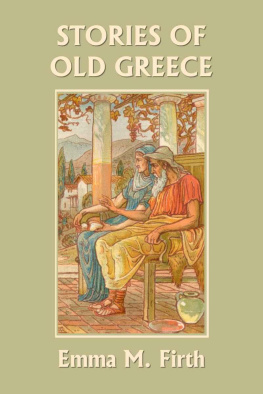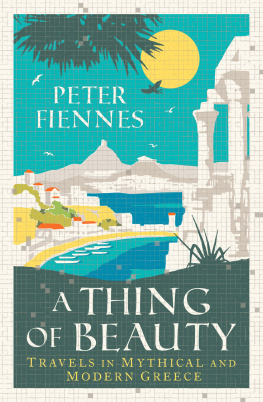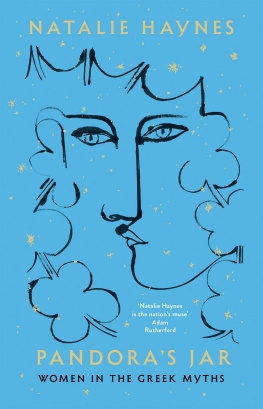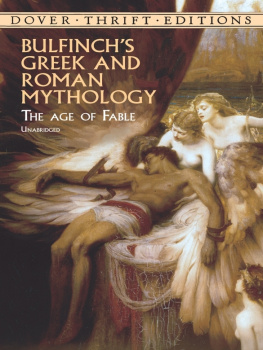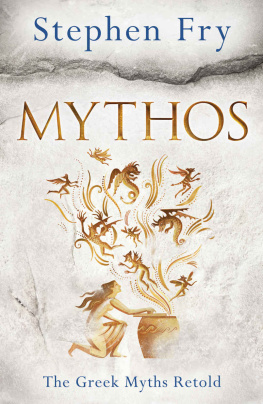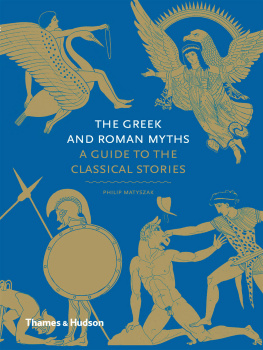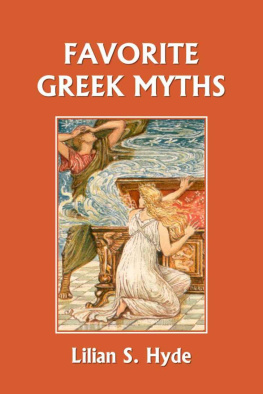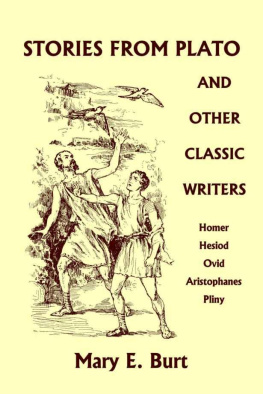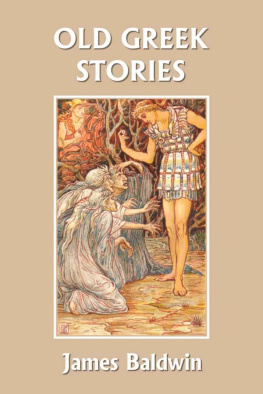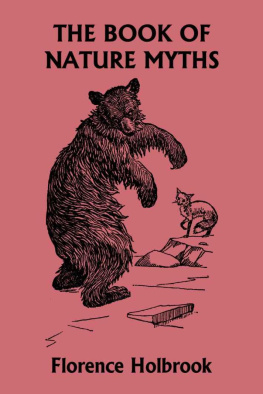Emma M. Firth - Stories of Old Greece
Here you can read online Emma M. Firth - Stories of Old Greece full text of the book (entire story) in english for free. Download pdf and epub, get meaning, cover and reviews about this ebook. year: 2009, publisher: Yesterdays Classics, genre: Art. Description of the work, (preface) as well as reviews are available. Best literature library LitArk.com created for fans of good reading and offers a wide selection of genres:
Romance novel
Science fiction
Adventure
Detective
Science
History
Home and family
Prose
Art
Politics
Computer
Non-fiction
Religion
Business
Children
Humor
Choose a favorite category and find really read worthwhile books. Enjoy immersion in the world of imagination, feel the emotions of the characters or learn something new for yourself, make an fascinating discovery.
- Book:Stories of Old Greece
- Author:
- Publisher:Yesterdays Classics
- Genre:
- Year:2009
- Rating:3 / 5
- Favourites:Add to favourites
- Your mark:
- 60
- 1
- 2
- 3
- 4
- 5
Stories of Old Greece: summary, description and annotation
We offer to read an annotation, description, summary or preface (depends on what the author of the book "Stories of Old Greece" wrote himself). If you haven't found the necessary information about the book — write in the comments, we will try to find it.
Stories of Old Greece — read online for free the complete book (whole text) full work
Below is the text of the book, divided by pages. System saving the place of the last page read, allows you to conveniently read the book "Stories of Old Greece" online for free, without having to search again every time where you left off. Put a bookmark, and you can go to the page where you finished reading at any time.
Font size:
Interval:
Bookmark:
All rights reserved. No part of this book may be reproduced or retransmitted in any form or by any means without the written permission of the publisher.
This edition, first published in 2010 by Yesterday's Classics, an imprint of Yesterday's Classics, LLC, is an unabridged republication of the work originally published by D. C. Heath and Company in 1894. This title is available in a print edition (ISBN 978-1-59915-315-5).
Yesterday's Classics republishes classic books for children from the golden age of children's literature, the era from 1880 to 1920. Many of our titles are offered in high-quality paperback editions, with text cast in modern easy-to-read type for today's readers. The illustrations from the original volumes are included except in those few cases where the quality of the original images is too low to make their reproduction feasible. Unless specified otherwise, color illustrations in the original volumes are rendered in black and white in our print editions.
"There is an instinct in the human heart
Which makes all fables it has coined
To justify the reign of its belief,
And strengthen it by beauty's right divine
Veil in their inner cells a mystic gift,
Which, like the hazel twig in faithful hands,
Points surely to the hidden springs of truth."
Aside from their use as a means of strengthening the imagination, the myths embody ethical truths, which are helpful just in proportion to the intellectual activity which the stories arouse. The child lover will seek for the best means in accomplishing her end,the harmonious culture of the child. In all that she does, she will be governed by the purest motives.
The telling of a story has a broader meaning than that of entertainment. Its real motive is the making of what the child loves a means by which he may be led to a clearer understanding of his own powers and possibilities, and of his relations to others.
The child lives wholly in the present. He is semi-barbaric in his tendencies toward self-interest. He needs to be lifted from an indefinite present of childish pleasure to a definite understanding of his own powers, and a better exercise of his will. If by means of a story, well told, he can grasp the simple truth contained in it, he is making progress in the right direction. He is getting a foundation for the future study of literature, and gaining an appreciation for the beautiful in art.
All modern tendencies are to make children too realistic, and to stifle, rather than to cultivate, the fine imagination necessary to the creation or enjoyment of art and literature. By presenting these myths, the product of a primitive people, and therefore adapted to the child, because of their beauty and simplicity, we are giving him good material for the growth of a healthful imagination.
While the general motive for telling stories is this, there are special motives in each story, which, if thoroughly appreciated, may enhance the value of the story. The first myth, a flower and sun myth, is designed to inspire in the child a feeling for the beauty and dignity of friendship. The story of Phaethon emphasizes the folly of unreasonable requests. Baucis and Philemon teach respect for the aged, and hospitality. The Rhoecus urges the doing of the "duty which lies nearest." In nearly all the myths courage and self-forgetfulness are shown; and by arousing admiration for these qualities we may inspire in the child a desire to possess them.
These myths are meant to do for the little beginner what the study of literature does for the "children of a larger growth." They are but beginnings for beginners; but with the sincere hope that they may accomplish the desired results, the writer submits them to her fellow-teachers and to the dear children of America.
L ONG ago, when the earth was new and people had not lived long enough upon it to find out how little they really knew about it, there lived in a far-away country a simple and childlike people. The country was a small one, but it was very beautiful, and the people who lived in it loved it dearly. They loved its rugged mountains, green valleys, and swift-flowing streams. It is the little country which we call Greece; but then it was called Hellas.
The wide blue sea is on the east, and south, and west of Greece, but on the north there is a great wall of mountains, which separates it from the rest of Europe.
The Greeks have told many strange and beautiful stories about their country and its people. They were a strong and active people, and were fond of being out of doors and of all out-of-door amusements. Thus they became famous athletes. They could run swiftly, and could jump, wrestle, and use the bow and arrow with great accuracy and skill. They rode well on horseback, and were very proud of their queer, clumsy chariots, and of their ability to curb their fiery steeds.
Their chariots were clumsy because they were very heavy; but the finer ones were as beautiful as the Greeks could make them with carvings, gold, and jewels.
They used their chariots in war, and in their chariot races. In war the Greeks were brave, and their heroes were the men who were the best warriors. They loved beautiful colors, fine pictures and statues; and their houses and temples were grander than any we have to-day. They were more skilful than we are in the art of carving statues from ivory and marble.
They made statues of their heroes and their gods.
It is strange that people who were so wise in many things knew nothing of the great God who made the earth. They thought that there were many gods, and that these gods lived in a beautiful place on the top of Mount Olympus. They thought that their gods were very much like themselves, but were wiser, and far more beautiful. Zeus was the greatest of the gods, and the Greeks believed that they heard his voice in the thunder. His wife, Hera, was pleasant to look upon, yet she had very unpleasant manners, and an unfortunate habit of turning into an animal any one who displeased her.
Poseidon lived in a beautiful palace at the bottom of the sea. With his trident he caused mighty tempests, or stilled the angry waves. He was carried from place to place in a shell chariot drawn by fish-horses, which bounded so swiftly over the water that the chariot scarcely touched its waves. Demeter looked after the fields, and brought good harvests to the people. Athena taught them to be wise in many ways. She taught them to do all kinds of hard work; and Helios, the sun-god, drove his golden chariot across the sky every morning. There were many other gods of whom the Greeks asked help, and of whom they told the stories which we shall read.

DEMETER
H ELIOS, the beautiful, was the sun-god, whom the Greeks loved and honored. He was tall, and as straight as an arrow. He had blue eyes, and hair which fell in golden curls over his shoulders. His limbs were strong, and the muscles of his arms stood out in rounded curves like the arms of an athlete. The sun-god was indeed a famous horseman. Every morning he drove his golden chariot across the sky. This was not an easy thing to do, for the horses were as wild as the Arabian horses of Ilderim. Ah, but they were beautiful, with their flowing manes and tails, their flashing eyes, graceful limbs, and silky coats! Fire flashed from their nostrils as they ran, and no horses have ever been swifter than those which drew the golden chariot.
Font size:
Interval:
Bookmark:
Similar books «Stories of Old Greece»
Look at similar books to Stories of Old Greece. We have selected literature similar in name and meaning in the hope of providing readers with more options to find new, interesting, not yet read works.
Discussion, reviews of the book Stories of Old Greece and just readers' own opinions. Leave your comments, write what you think about the work, its meaning or the main characters. Specify what exactly you liked and what you didn't like, and why you think so.

